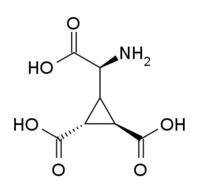DCG-IV
From Wikipedia, the free encyclopedia
 |
|
| Identifiers | |
|---|---|
|
|
| CAS Number | 147782-19-2 |
| PubChem (CID) | 5310979 |
| ChemSpider | 4470521 |
| ECHA InfoCard | 100.161.971 |
| Chemical and physical data | |
| Formula | C7H9NO6 |
| Molar mass | 203.149 g/mol |
| 3D model (Jmol) | Interactive image |
|
|
|
|
| (verify) | |
DCG-IV is a research drug which acts as a group-selective agonist for the group II metabotropic glutamate receptors (mGluR2/3).[1] It has potent neuroprotective and anticonvulsant effects in animal studies,[2][3][4][5] as well as showing anti-Parkinsonian effects,[6][7] but also impairs the formation of memories.[8][9]
References[edit]
- ^ Ishida M, Saitoh T, Shimamoto K, Ohfune Y, Shinozaki H (August 1993). "A novel metabotropic glutamate receptor agonist: marked depression of monosynaptic excitation in the newborn rat isolated spinal cord". British Journal of Pharmacology. 109 (4): 1169–77. doi:10.1111/j.1476-5381.1993.tb13745.x. PMC 2175774
 . PMID 8401927.
. PMID 8401927. - ^ Bruno V, Copani A, Battaglia G, Raffaele R, Shinozaki H, Nicoletti F (April 1994). "Protective effect of the metabotropic glutamate receptor agonist, DCG-IV, against excitotoxic neuronal death". European Journal of Pharmacology. 256 (1): 109–12. doi:10.1016/0014-2999(94)90624-6. PMID 7517889.
- ^ Yoshioka H, Sugita M, Kinouchi H (September 2009). "Neuroprotective effects of group II metabotropic glutamate receptor agonist DCG-IV on hippocampal neurons in transient forebrain ischemia". Neuroscience Letters. 461 (3): 266–70. doi:10.1016/j.neulet.2009.06.056. PMID 19549561.
- ^ Attwell PJ, Singh Kent N, Jane DE, Croucher MJ, Bradford HF (September 1998). "Anticonvulsant and glutamate release-inhibiting properties of the highly potent metabotropic glutamate receptor agonist (2S,2'R, 3'R)-2-(2',3'-dicarboxycyclopropyl)glycine (DCG-IV)". Brain Research. 805 (1-2): 138–43. doi:10.1016/S0006-8993(98)00698-2. PMID 9733953.
- ^ Fei Z, Zhang X, Bai HM, Jiang XF, Wang XL (December 2006). "Metabotropic glutamate receptor antagonists and agonists: potential neuroprotectors in diffuse brain injury". Journal of Clinical Neuroscience. 13 (10): 1023–7. doi:10.1016/j.jocn.2005.11.042. PMID 17113985.
- ^ Dawson L, Chadha A, Megalou M, Duty S (February 2000). "The group II metabotropic glutamate receptor agonist, DCG-IV, alleviates akinesia following intranigral or intraventricular administration in the reserpine-treated rat". British Journal of Pharmacology. 129 (3): 541–6. doi:10.1038/sj.bjp.0703105. PMC 1571875
 . PMID 10711353.
. PMID 10711353. - ^ Venero JL, Santiago M, Tomás-Camardiel M, Matarredona ER, Cano J, Machado A (2002). "DCG-IV but not other group-II metabotropic receptor agonists induces microglial BDNF mRNA expression in the rat striatum. Correlation with neuronal injury". Neuroscience. 113 (4): 857–69. doi:10.1016/S0306-4522(02)00232-4. PMID 12182892.
- ^ Huang LQ, Rowan MJ, Anwyl R (February 1997). "mGluR II agonist inhibition of LTP induction, and mGluR II antagonist inhibition of LTD. induction, in the dentate gyrus in vitro". NeuroReport. 8 (3): 687–93. doi:10.1097/00001756-199702100-00022. PMID 9106748.
- ^ Sato T, Tanaka K, Ohnishi Y, Teramoto T, Irifune M, Nishikawa T (February 2004). "Inhibitory effects of group II mGluR-related drugs on memory performance in mice". Physiology & Behavior. 80 (5): 747–58. doi:10.1016/j.physbeh.2003.12.010. PMID 14984810.
| This drug article relating to the nervous system is a stub. You can help Wikipedia by expanding it. |